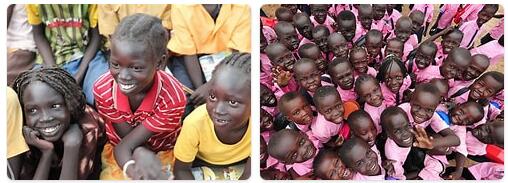Yearbook 2016
Sudan. The current population of Sudan is 43,849,271. Sudan and its president Omar al-Bashir continued to be involved in a power struggle with the International Criminal Court (ICC).

Despite an international arrest warrant issued by the ICC against al-Bashir for suspected war crimes and other crimes in Darfur, he continued to travel extensively. For example, he attended a summit of the African Union (AU) in Rwanda. ICC’s Prosecutor Fatou Bensouda stated in June that she lacked support to pursue the case.
According to thereligionfaqs, Sudan, which is affiliated with Saudi Arabia, broke diplomatic relations with Iran in January. The country has already contributed soldiers to the coalition that Saudi Arabia is leading against Iran-backed Shiite rebels in Yemen.
In January, it was announced that the border with South Sudan would be opened again. The countries negotiated without much success on lowering transit fees that Sudan charges on oil from South Sudan. Overall, the Sudanese economy showed few signs of clearing. Protests took place in Khartoum and other cities in November against lower subsidies on gasoline, which increased the price by 30%. There was a shortage of various goods, partly as a result of import restrictions to safeguard the scarce foreign exchange reserve. Inflation was 19.6% in October. Several newspapers and a TV station reporting on protests were closed.
The situation in the Darfur region remained worrying. In March, more than 100,000 people were on the run after escalated fighting between government forces and the SLMAW rebel group. Despite this, a referendum on Darfur’s status was held April 11-13. Over 97% voted to retain the five states that make up the region. The opposition and rebel groups such as SLM-AW and JEM (the Movement for Justice and Equality) boycotted the vote. Sudan refuted data from the human rights group Amnesty International that chemical weapons were used in Darfur. The UN called on Sudan to cooperate in an investigation. In June, the UN Security Council extended the mandate of the AU and UN Joint Force UNAMID in Darfur, despite Sudan’s protests.
Struggles were also fought in the provinces of the Blue Nile and South Kurdufan against the rebel movement SPLM-North (Sudanese people’s liberation movement). The government announced a unilateral ceasefire in June and several rounds of talks were held with SPLM-North without success.
In March, however, Islamist leader Hassan al-Turabi, who turned 84 years old. As leader of the Muslim Brotherhood, he was one of the forces behind the 1989 coup that brought al-Bashir to power. The two broke later, and al-Turabi was occasionally jailed or in house arrest.
Military junta, demonstrations and negotiations
While the protesters demanded the release of the political prisoners and regime change, and the military transitional government hit hard on them (16 people were killed on April 13, causing Salah Gosj to retire as security and intelligence chief), al-Bashir was deployed prison on April 17.
On May 13, prosecutors accused al-Bashir of calling for the killing of protesters. The following day, another five were killed in Khartoum’s streets, although the protest movement had begun talks with the military junta. On May 15, a three-year transition period for a civilian board was proposed.
Meanwhile, the junta asked for international support it received from Saudi Arabia, the United Arab Emirates, Egypt and Russia. At the same time, the demonstrations continued in Khartoum and other cities in Sudan. With both sides putting pressure on their opponents (namely the military junta demanding the end of the demonstrations, and the protesters seeking faster transition to civilian rule), it didn’t take long before the conflict situation escalated: on June 3, dozens of protesters were killed, the corpses were threw in the Nile and found a few days afterwards.
On June 5, the United States, the United Kingdom and Norway asked the junta to negotiate with the opposition, supporters of a transitional government also called for the resumption of talks, and while the UN brought staff out of the country (June 5), and the AU blocked out Sudan (June 6), Ethiopian Prime Minister Abiy Ahmed came to Khartoum to mediate (June 7). His mediation was one of the reasons why he was awarded the 2019 Nobel Peace Prize.
Demonstrations, violence and killings continued, however, and it was the turn of the United States to send diplomats to mediation (June 12).
On June 13, al-Bashir was indicted for corruption and on June 14, the military council admitted “wrong” to the protesters. Nevertheless, the junta rejected proposals for a civil transitional government (outlined by the Ethiopian broker) and unrest started again. After 128 people were killed, the protest movement and the military council came together for new talks on July 3. On July 5, the two parties agreed to share power until elections have been held in the country.
As protests continued, the junta announced that they were likely to halt military coup attempts on July 11 and 24. Port bans in El-Obeid (July 29) and closure of schools nationwide (July 30) mark the final phase of the conflict before a new agreement on August 3 on a constitutional declaration that will set the framework for the division of power over the next three years.
Agreement on civil transitional government
On August 17, the agreement was signed in a peaceful and festive ceremony marked by the UN and celebration in Khartoum and other cities. On August 19, the trial began against al-Bashir for corruption. The day after Sudan’s sovereignty council appointed Abdalla Hamdok as prime minister, he was sworn in on 21 August. He cannot participate in the General Election, which will take place in 2022, which should end the stormy transition period that Sudan has been in since February 2019. Al-Bashir was convicted of corruption on December 19, 2019 and will serve two years in prison.